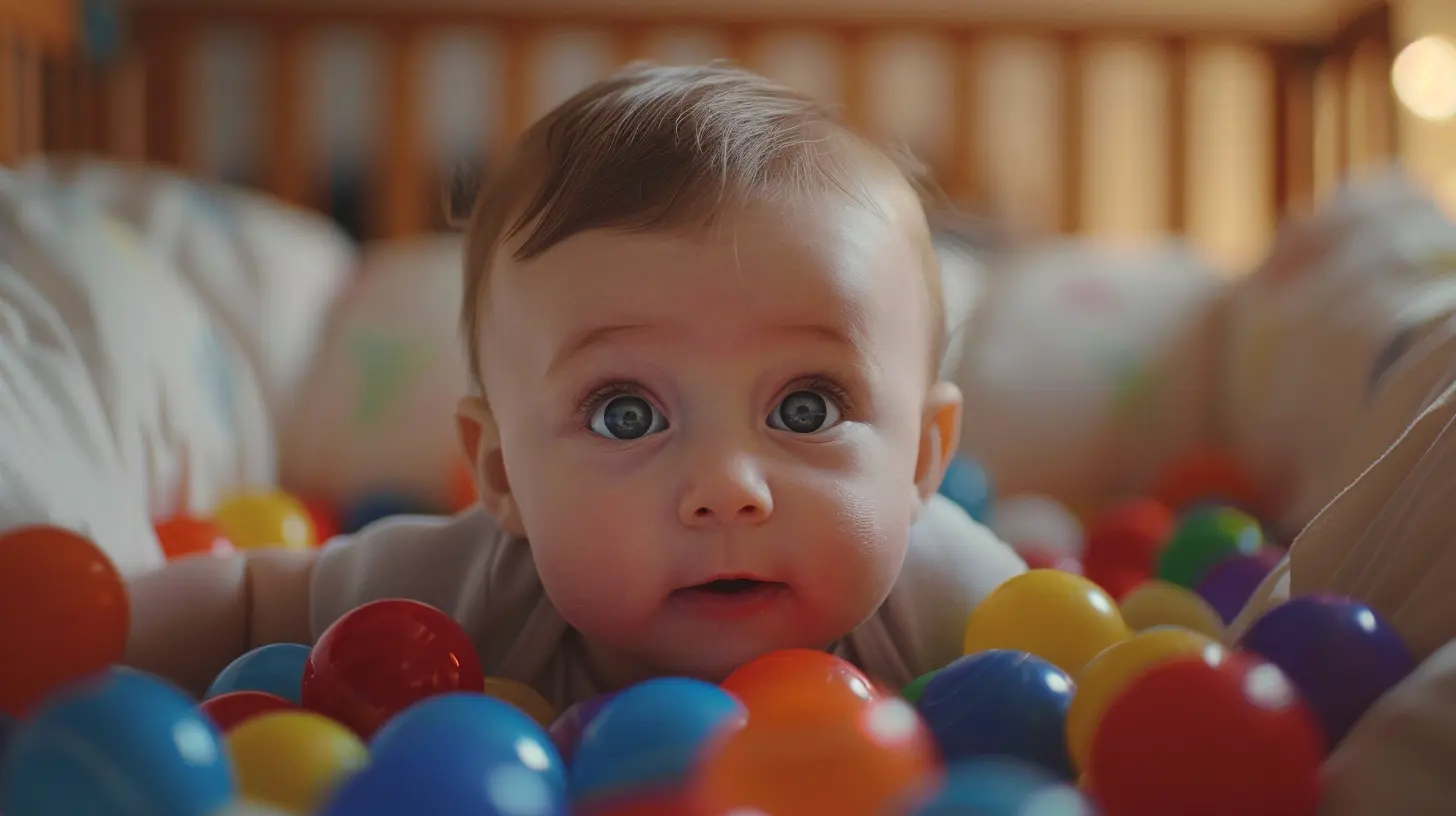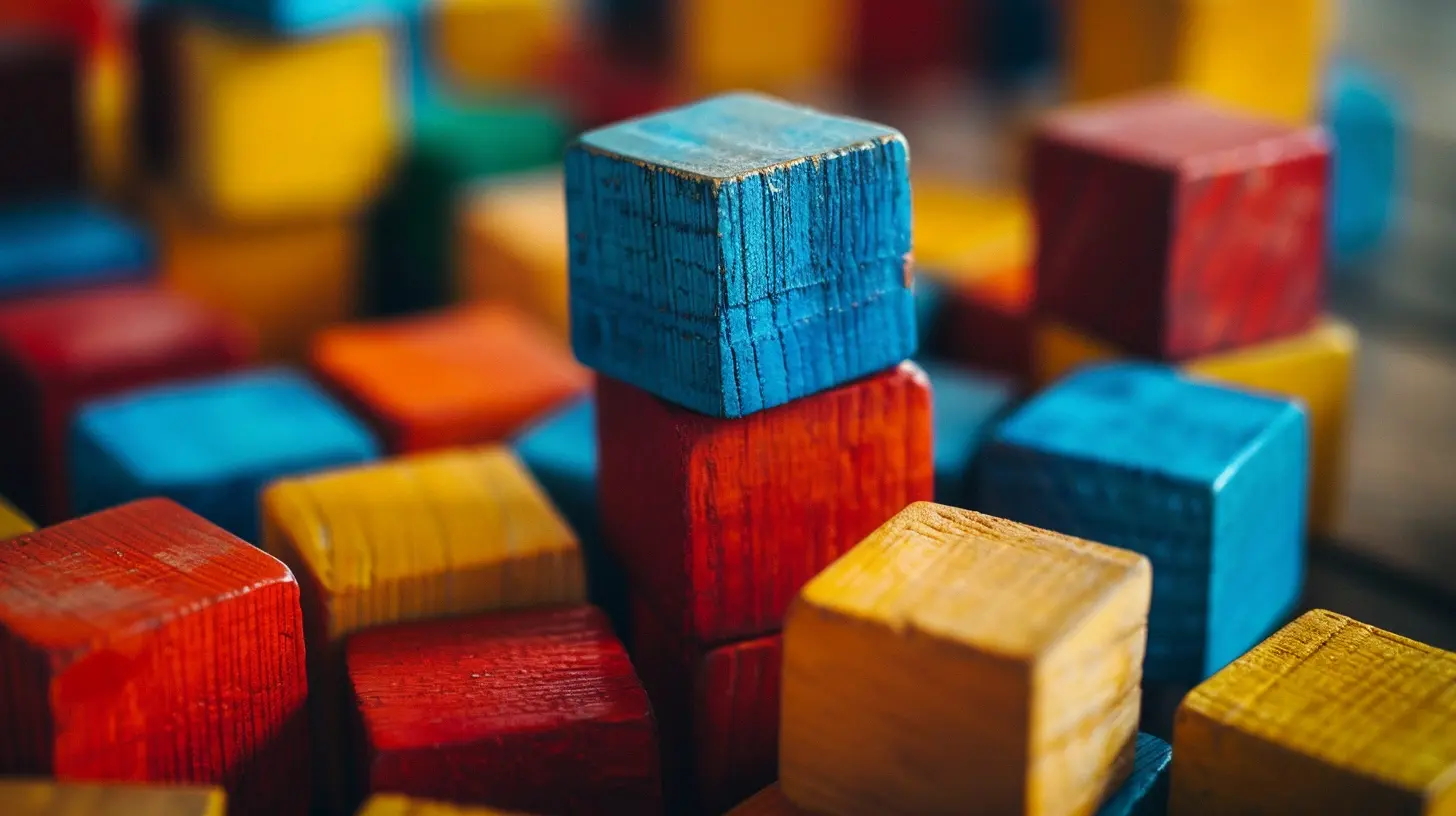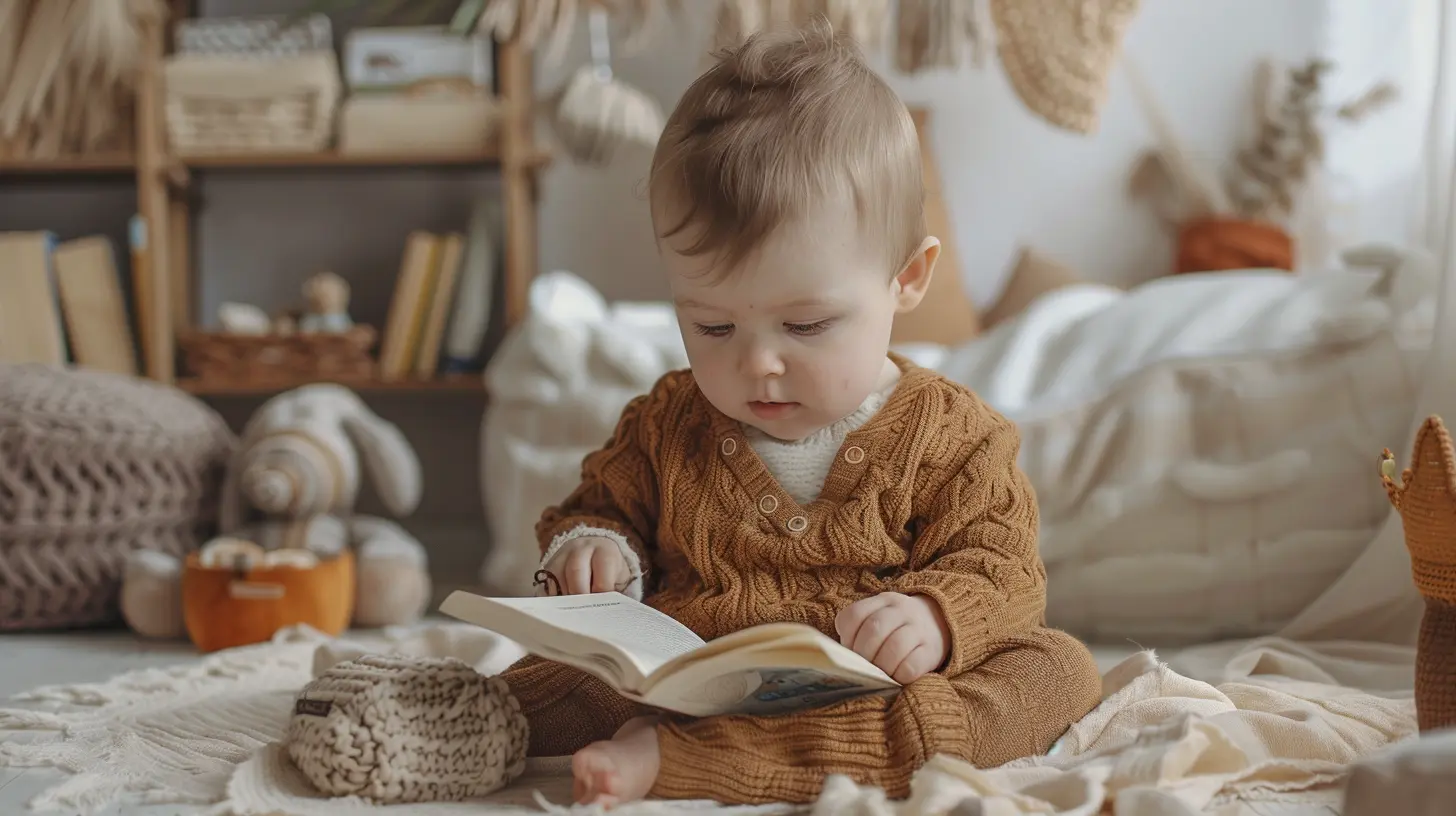How to Support Your Baby's Independent Play for Cognitive Growth
1 December 2024
As parents, we all want to see our little bundle of joy grow into confident, inquisitive individuals. But aside from the obvious nurturing, did you know that giving your baby some space to play on their own can significantly boost their cognitive development? Independent play helps babies learn to entertain themselves, explore their environment, and develop critical problem-solving skills.
In this blog post, we'll dive into how to support your baby’s independent play in ways that promote cognitive growth, while keeping them safe and engaged. And don't worry—this doesn’t mean you just leave them alone in the crib for hours (because who would do that?), but rather, it’s all about giving them the tools and opportunities to engage in discovery on their own terms.

What Exactly is Independent Play?
Before we jump into the strategies, let's clarify what independent play actually is. Simply put, it's exactly what it sounds like—babies playing on their own without direct guidance from a caregiver. Think of independent play as your baby’s personal time to explore toys, sounds, and their surroundings.Of course, this doesn’t mean you’re completely hands-off. You’re still present, whether you're in the same room or keeping an eye on them from a distance. Independent play encourages your little one to problem-solve, experiment, and learn through trial and error—all of which are vital for cognitive development.

The Benefits of Independent Play
Why is independent play such a big deal? Well, it’s more than just giving yourself a breather (though that’s a nice perk!). Here are some notable benefits:- Cognitive Development: Babies learn to think critically, solve problems, and explore cause-and-effect relationships.
- Emotional Independence: Developing the ability to self-soothe and play alone builds confidence.
- Creativity: Without constant adult intervention, babies can use their imagination freely.
- Self-Discovery: Independent play allows babies to better understand their surroundings and their own abilities.
Now that we know why it's essential, let’s get practical and explore how to support this powerful learning tool.

How to Support Your Baby's Independent Play for Cognitive Growth
1. Start with a Safe, Stimulating Environment
First things first—create a safe space where your baby can play. This could be a baby-proofed corner of a room, a playpen, or even a soft mat on the floor. The more freedom they have to move around and explore, the more they'll learn.Make sure the play area has a variety of age-appropriate toys. Keep in mind that babies don't always need the fanciest gadgets (in fact, sometimes the simpler the toy, the more room for imagination). Think soft blocks, stacking rings, musical toys, or even household items like spoons or cups—they can stimulate a baby's senses and curiosity.
Pro Tip: Rotate the Toys
Over time, babies can get bored with the same old toys, just like we tire of doing the same activity over and over. Try rotating toys every few days to keep things fresh and engaging. It also teaches them that there's always something new to explore.2. Start Small—and Gradually Increase Playtime
Naturally, your baby isn't going to dive into independent play for an hour at a time right off the bat (and that's okay!). Start with just a few minutes a day, and gradually increase the amount of time they spend playing on their own.This allows them to get comfortable with the idea of being alone (but safely supervised) and enables them to build up their attention span over time. You might start by putting them down with a toy while you fold some laundry, and slowly increase the gap between your involvement and their play.
Remember, you want to foster independence, not abandonment—so it’s totally fine to give a reassuring glance or smile every now and then to let them know you're nearby.
Rhetorical Question: Would You Expect to Run a Marathon on Day One?
Think of this in terms of running a marathon. You wouldn’t expect to run 26 miles on your first day, right? Similarly, building up your baby’s independent play stamina is a gradual process. Start slow, and give them the tools they need to succeed.3. Encourage Open-Ended Play
Not all toys are created equal. Some toys—like electronic devices or toys that “perform” for the child—don’t engage your baby’s mind as much as toys that allow for open-ended play. Open-ended toys let babies figure out how to use them in different ways. They have no specific “purpose,” like blocks, stacking cups, or even simple fabric strips. Your baby can engage in creative, imaginative play, which is fantastic for cognitive development.Open-ended play helps babies learn cause and effect. For example, they might realize that stacking certain objects makes them taller, while knocking them down creates noise. They can explore and innovate—and this trial-and-error process promotes problem-solving skills.
4. Provide Gentle, Positive Reinforcement
When your baby is engaged in independent play, resist the temptation to intervene every moment. However, it’s still important to occasionally acknowledge the effort they’re putting into their playtime. You can offer gentle encouragement without taking over. A simple “Wow, look what you’re doing!” or “You’re playing so well!” can go a long way in letting them know you’re proud of them but that they are in control of their play.With that said, avoid giving too much direction. Let your baby take the lead as much as possible.
5. Create Routine and Consistency
Babies thrive on routine, so including independent play in their day-to-day schedule is crucial. You might find that your baby is more relaxed and open to playing alone at certain times of the day—maybe after a nap or mealtime. Work independent play into their natural rhythm, and over time, it’ll become an important part of their daily routine.Having a consistent time for independent play also helps babies understand what to expect and when to expect it. This reduces anxiety and makes the whole process feel much more natural for them (and you).
6. Be Present Without Being Directly Involved
It’s a bit of a balancing act, but when your baby is practicing independent play, try to remain within their field of vision without hovering. The goal is for them to know that you're nearby, but they don’t need to rely on you for constant interaction during that time.What this does is create a sense of security; they don’t feel abandoned, but they also know that this time is their own to explore. If you’re out of sight, consider saying things like, "I’m right in the kitchen if you need me!" This gives them reassurance without disrupting their focus.
7. Emphasize Sensory Play
Sensory play taps into sight, sound, touch, and even smell, offering an enriching environment for cognitive development. Sensory activities stimulate brain growth by encouraging babies to explore textures, colors, noises, and shapes. Simple activities like giving your baby a range of textures with fabric scraps, crinkly paper, or baby-safe sand can do wonders for their sensory and cognitive growth.The more senses you engage, the more neural connections are formed in their rapidly-developing brains. And guess what? You don’t need a fancy sensory table. Everyday items, like soft cotton, wooden spoons, or even water play with measuring cups, can provide fantastic learning experiences.
8. Celebrate Small Wins
As your baby gets the hang of independent play, celebrate their milestones—whether it's figuring out how to stack blocks for the first time or exploring a new toy on their own. Just like adults, babies benefit from feeling accomplished. A little celebration enhances their self-esteem and eagerness to continue exploring.But here's the key—keep it balanced. If you make a huge fuss over every little thing, they may start seeking validation rather than focusing on their newfound independence. The trick is to ensure that any praise you provide is subtle and encourages self-discovery.
9. Stay Calm and Patient
This final tip is more for you as a parent. Independent play doesn’t always come easily, and there will be days when your baby just isn’t into it. That’s normal! Patience is key here. Don’t stress or feel like you’re doing something wrong if they want more attention some days.Your baby is learning new things every minute, and independent play is just one piece of the bigger puzzle. Stay calm, be consistent, and trust that you’re laying the foundation for some incredible cognitive growth!

Final Thoughts: Trust the Process
Supporting your baby’s independent play for cognitive growth is an investment in their long-term development. It might seem slow at first, but over time, you’ll notice your baby becoming more engaged, confident, and imaginative. They will learn how to entertain themselves and explore their surroundings with curiosity.So, grab a cup of coffee, take a deep breath, and let your little one discover the world at their own pace. You’ve got this!
all images in this post were generated using AI tools
Category:
Infant DevelopmentAuthor:

Maya Underwood
Discussion
rate this article
14 comments
Sabina Carter
Encouraging independent play? Just remember: when your baby invents a new game involving spaghetti and a cat, you might want to supervise from a safe distance!
February 11, 2025 at 5:34 PM

Maya Underwood
Absolutely! Supervision is key, especially when creativity combines with curious little hands. Enjoy the fun (and potential chaos) from a safe distance!
Annabelle Chapman
This article wisely emphasizes the importance of fostering independent play for cognitive development. Encouraging self-discovery not only enhances problem-solving skills but also instills confidence, setting a strong foundation for lifelong learning.
February 1, 2025 at 5:46 PM

Maya Underwood
Thank you for your insightful comment! I completely agree that fostering independent play is crucial for developing problem-solving skills and confidence in children.
Zevin McLoughlin
Encouraging independent play nurtures creativity and problem-solving skills, empowering our children to explore their world. It's a delicate balance of guidance and freedom that fosters their cognitive growth.
January 29, 2025 at 5:07 PM

Maya Underwood
Thank you for highlighting the importance of balancing guidance and freedom! Independent play truly is vital for fostering creativity and problem-solving skills in children.
Lacey McLanahan
Encourage exploration with safe spaces and engaging toys. Great tips!
January 27, 2025 at 3:57 AM

Maya Underwood
Thank you! I'm glad you found the tips helpful for fostering independent play and exploration!
Faelan McGill
Empowering your baby’s independent play is a beautiful gift! It nurtures their creativity, problem-solving skills, and confidence. Embrace their exploration and watch them thrive—each moment of play is a building block for cognitive growth and lifelong learning. Celebrate their journey!
January 23, 2025 at 3:28 PM

Maya Underwood
Thank you! I completely agree—encouraging independent play is essential for fostering creativity and cognitive development. Every moment of exploration truly contributes to their growth!
Mara Newman
Unlock the secret world of your baby’s imagination. Independent play isn't just fun; it's a gateway to untold discoveries. Dive into the mystery of their minds and witness the magic of cognitive growth unfold before your eyes.
January 20, 2025 at 5:45 AM

Maya Underwood
Thank you! Encouraging independent play truly unlocks a world of creativity and cognitive development for our little ones.
Emily McVeigh
Encourage exploration to boost cognitive development.
January 18, 2025 at 5:12 AM

Maya Underwood
Absolutely! Encouraging exploration is key to fostering independence and enhancing cognitive skills in babies.
Brigitte McCall
Encouraging independent play fosters critical thinking and problem-solving skills in babies. By creating a safe, stimulating environment, parents empower their children to explore creatively, enhancing cognitive development and building confidence in their abilities.
January 7, 2025 at 4:20 PM

Maya Underwood
Thank you for your insightful comment! I wholeheartedly agree that encouraging independent play is vital for cognitive development and building confidence in children. Creating a safe and stimulating environment is key to fostering their creativity and problem-solving skills.
Nadine Barnes
“Encourage exploration; independence fosters creativity and confidence.”
December 26, 2024 at 4:30 AM

Maya Underwood
Absolutely! Encouraging exploration through independent play not only enhances cognitive development but also builds creativity and confidence in your child.
Raegan McLaury
Supporting your baby's independent play is such a beautiful journey! It nurtures their curiosity and cognitive skills while allowing them to explore the world at their own pace. Remember, each moment of independent play contributes to their growth—trust in their natural abilities. You're doing great!
December 18, 2024 at 5:04 PM

Maya Underwood
Thank you! Supporting independent play truly fosters curiosity and growth in our little ones, and I'm glad you recognize its importance.
Kismet Estes
Thank you for this insightful article! Encouraging independent play truly seems essential for cognitive development. Your tips are practical and easy to implement. I’m excited to foster my baby's creativity and problem-solving skills through playtime. Looking forward to trying these suggestions!
December 12, 2024 at 3:36 AM

Maya Underwood
Thank you for your kind words! I'm glad you found the tips helpful. Enjoy fostering your baby's creativity through play!
Nyx McGuire
Encouraging independent play nurtures creativity and boosts your baby's development!
December 6, 2024 at 5:37 AM

Maya Underwood
Thank you for your insight! Independent play truly lays the foundation for creativity and cognitive development in babies.
Etta Snow
Encouraging independent play nurtures cognitive development by fostering creativity and problem-solving skills, allowing babies to explore and learn at their own pace.
December 3, 2024 at 5:43 PM

Maya Underwood
Thank you! Encouraging independent play is indeed essential for nurturing creativity and problem-solving in babies, allowing them to explore and learn at their own pace.
Reid Sharpe
Great insights! Encouraging independent play truly fosters creativity and development. Thanks!
December 2, 2024 at 4:06 AM

Maya Underwood
Thank you! I'm glad you found the insights helpful. Encouraging independent play is indeed vital for a child's development!
MORE POSTS

How to Create Meaningful Traditions During the Everyday

Emotional Coaching: How to Become Your Child’s Emotional Support System

How Regular Chores Can Reduce Sibling Rivalry

Stress-Free Potty Training for the Busy Parent

The Developmental Benefits of Baby Mimicry: Why Babies Copy You

Adapting Childhood Traditions for Your Own Family

Why Connection Is Key to Effective Discipline

The Power of Empathy in Defusing Tantrums

The Ideal Nap Schedule for a Happy, Well-Rested Baby